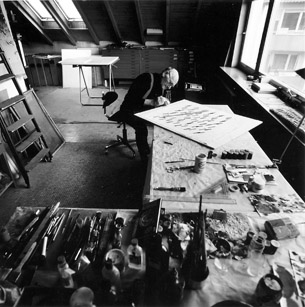Anton Stankowski · Exhibition · Information · Catalogue · Press · Contact · German Version · Credits


Anton Stankowski
In his studio
Fleckenweinberg 43
Anton
Stankowski
An Overview
Anton Stankowski was born on 18 June 1906 in Gelsenkirchen, Germany. His
most important teacher was Max Burchartz at the Folkwangschule in Essen,
where — after completing an apprenticeship and his journeyman years
as a decorative painter — he studied for three semesters, starting
in 1926. After a short stint free-lancing for the Canis Advertising Agency
in Bochum, the 23-year-old Stankowski was invited toward the end of 1929
to work at Max Dalang’s famous advertising studio in Zurich. This
marked the beginning of an important time: Stankowski’s photographic
and typographical work developed into a prototype for a contemporary advertising
style, later called “constructive graphics.” Stankowski quickly
made friends with people who later became known as the “Zuricher
Konkreten,” Richard P. Lohse, Verena Loewensberg, Max Bill, and
others. In 1934 Stankowski lost his work permit and he moved to Lörrach,
Switzerland, before finally returning to Germany in 1938. In 1939 Stankowski
founded his Grafische Atelier in Stuttgart. Shortly thereafter, he was
drafted into the army and had to go to war. After the war, he connected
with leading characters of the visual movement, such as Baumeister, Hugo
Häring, Kurt Leonhard, Mia Seeger, Egon Eiermann, Max Bense, and
Walter Cantz. Thanks in part to Stankowski’s work, Stuttgart became
a Mecca for graphic design in the 1950s.
In 1972 Karl Duschek became a partner at in the Grafische Atelier, and
important designs were developed for companies such as the Deutsche Bank
and the Münchner Rück insurance company, for example. Increasingly,
Stankowski concentrated upon painting, devoting himself to it completely
until his death in 1998. During his lifetime, Stankowski received many
honors, such as an honorary professorship from the State of Baden-Württemberg,
the art prize from the City of Stuttgart, and, in the year of his death,
the Ehrenpreis des Deutschen Künstlerbundes — the Harry Graf
Kessler Prize — for his life’s work.
Links_______________________
